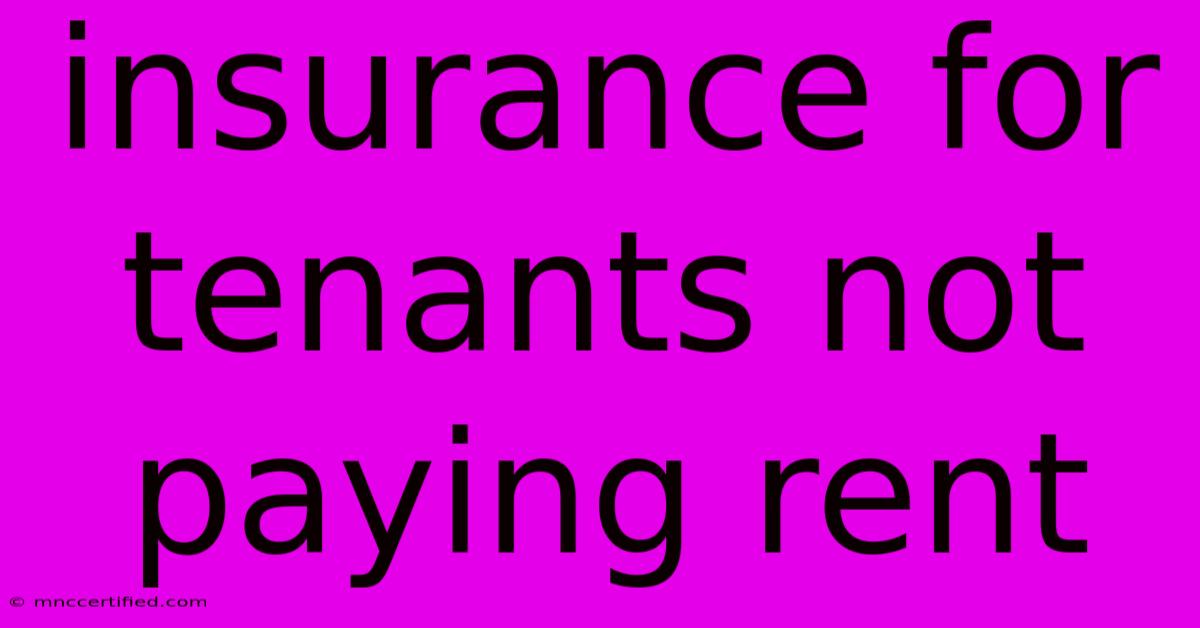Insurance For Tenants Not Paying Rent

Table of Contents
Landlord's Nightmare: Protecting Yourself from Non-Paying Tenants
Being a landlord comes with its fair share of challenges, and one of the biggest headaches is dealing with tenants who don't pay rent. It's a situation that can quickly turn a promising investment into a financial drain. Fortunately, there are insurance options available specifically designed to protect landlords from this kind of risk.
Understanding the Problem: Why Tenants Don't Pay Rent
Before diving into insurance options, it's important to understand the reasons behind tenant non-payment. Some common culprits include:
- Financial hardship: Job loss, unexpected medical bills, or a decline in income can leave tenants struggling to make rent.
- Disputes with the landlord: Unresolved maintenance issues, unfair rent increases, or breaches of the lease agreement can lead to tenants withholding rent as a form of protest.
- Deliberate default: Unfortunately, some tenants may simply choose to stop paying rent, whether due to a lack of responsibility or a desire to move out without fulfilling their obligations.
Rent Guarantee Insurance: A Lifeline for Landlords
Rent guarantee insurance acts as a safety net for landlords, protecting you from financial losses caused by non-paying tenants. This type of insurance typically covers:
- Unpaid rent: The insurance company will reimburse you for rent payments missed by your tenant, up to a certain limit.
- Legal costs: Should you need to take legal action to evict a tenant, the insurance may cover the associated legal fees.
- Vacancy costs: In some cases, the insurance may cover the costs of finding a new tenant and preparing the property for a new lease.
How Rent Guarantee Insurance Works
The process of claiming on rent guarantee insurance is relatively straightforward:
- Report the non-payment: Contact your insurance provider as soon as you know your tenant is not paying rent.
- Provide documentation: You'll need to provide proof of the lease agreement, attempts to contact the tenant, and any other relevant documentation.
- The insurance company investigates: The insurance provider will investigate the situation and verify the claim.
- Receive reimbursement: If the claim is approved, the insurance company will reimburse you for the unpaid rent and other covered costs.
Choosing the Right Rent Guarantee Insurance
When selecting rent guarantee insurance, consider these factors:
- Coverage limits: Ensure the policy's limits are sufficient to cover the potential financial risk.
- Exclusions: Understand the circumstances that are not covered by the insurance, such as intentional damage caused by the tenant.
- Premium: Compare prices from different insurance providers to find the best value.
Beyond Rent Guarantee: Additional Landlord Insurance Options
In addition to rent guarantee insurance, there are other forms of landlord insurance that can provide comprehensive protection:
- Landlord liability insurance: Covers you for accidents or injuries that occur on your property, protecting you from lawsuits and potential financial burdens.
- Building insurance: Provides coverage for damage to the building itself, including fire, flood, or other perils.
- Contents insurance: Protects your personal belongings kept within the rental property, like furniture, appliances, or tools.
Proactive Measures to Mitigate Risk
While insurance can offer valuable protection, it's also wise to implement proactive measures to minimize the risk of non-paying tenants:
- Thorough tenant screening: Conduct thorough background checks and reference checks to assess potential tenants' financial stability and rental history.
- Clear lease agreement: Ensure the lease agreement is detailed and clearly outlines the tenant's responsibilities, including rent payment terms.
- Regular communication: Maintain open communication with your tenants and promptly address any concerns or issues that arise.
Investing in the right insurance and taking preventative measures can significantly reduce the financial burden of dealing with non-paying tenants. Remember, it's always better to be prepared than to regret not having the necessary protection.

Thank you for visiting our website wich cover about Insurance For Tenants Not Paying Rent. We hope the information provided has been useful to you. Feel free to contact us if you have any questions or need further assistance. See you next time and dont miss to bookmark.
Featured Posts
-
Charlotte Tilbury Beauty Authoritys Claim
Nov 10, 2024
-
Chestnut Farms Bottled In Bond Review
Nov 10, 2024
-
Idris Elbas Wifes Regret About Meghan Markle
Nov 10, 2024
-
Where To Watch Lsu Vs Alabama Football Game
Nov 10, 2024
-
College Football Georgia Vs Ole Miss Updates
Nov 10, 2024